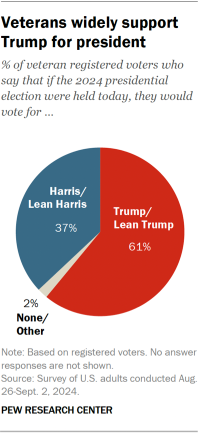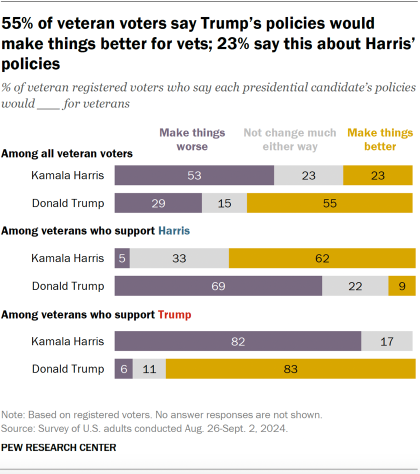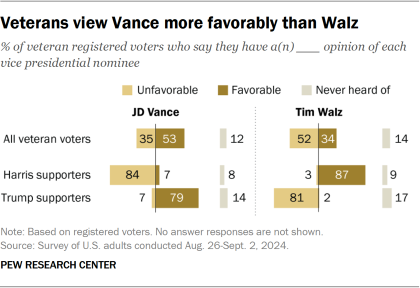| | Yeah, but just like the farmers, and poor rural folks, they voted for Trump big time, and probably blame the dems!
PEW poll: "Military veterans remain a Republican group, backing Trump over Harris by wide margin
By Joseph Copeland
Military veterans have long tended to affiliate with the Republican Party and support Republican candidates, and that remains the case today.
 About six-in-ten registered voters who say they have served in the U.S. military or military reserves (61%) support former President Donald Trump in the 2024 presidential election, while 37% back Vice President Kamala Harris, according to a Pew Research Center survey conducted in early September. About six-in-ten registered voters who say they have served in the U.S. military or military reserves (61%) support former President Donald Trump in the 2024 presidential election, while 37% back Vice President Kamala Harris, according to a Pew Research Center survey conducted in early September.
Veterans’ vote preferences are on par with past elections. In 2020, 60% of veteran validated voters cast their ballot for Trump, while 39% backed President Joe Biden. And in 2016, veterans voted for Trump over former Secretary of State Hillary Clinton by a similar margin (61% to 35%).
The vice presidential candidates on both tickets – Republican Sen. JD Vance and Democratic Gov. Tim Walz – have served in the armed forces. Vance was in the U.S. Marines and Walz was in the National Guard.
According to the Census Bureau, about 6% of American adults have served in the military, a substantially smaller share than a few decades ago. In 1980, about 18% of U.S. adults were veterans.
How we did this
Related: The changing face of America’s veteran population
How veteran voters identify politicallyVeteran voters have long been more likely to align themselves with the Republican Party than the Democratic Party. According to our recent analysis of partisan identification:
- 63% of veteran voters identify with or lean toward the Republican Party, while 35% are Democrats or Democratic leaners.
- As with voters overall, there are demographic differences in veterans’ partisan identification. For example, about seven-in-ten White veterans (72%) identify with or lean toward the GOP. That compares with just 11% of Black veterans, who overwhelmingly identify as or lean Democratic (82%).
How veterans see the candidates’ policies and their impact on veteransMore than half of veteran voters (55%) say that if Trump wins the election, his policies would make things better for veterans. Only 23% say the same when it comes to Harris and her policies.
 Veteran supporters of both candidates are more likely to say their own candidate’s policies – as opposed to the other candidate’s policies – would make things better for veterans. But Trump supporters are far more likely than Harris supporters to say this of their candidate (83% vs. 62%). Veteran supporters of both candidates are more likely to say their own candidate’s policies – as opposed to the other candidate’s policies – would make things better for veterans. But Trump supporters are far more likely than Harris supporters to say this of their candidate (83% vs. 62%).
A third of veterans who support Harris say that her policies would not change things much either way for them. Only 11% of Trump supporters say the same about their candidate.
Large majorities of each nominee’s supporters say that the other candidate would make things worse for veterans:
- 82% of veteran Trump supporters say Harris would make things worse.
- 69% of veteran Harris supporters say Trump would make things worse.
How veterans view the vice presidential candidatesVance and Walz, who will meet in a debate on Oct. 1, are both military veterans.
About half of veteran voters (53%) say they have a favorable view of Vance, while about a third (34%) say the same of Walz.
 Compared with voters overall, veterans are much more likely to hold positive views about Vance and negative views about Walz. Compared with voters overall, veterans are much more likely to hold positive views about Vance and negative views about Walz.
Overwhelming majorities of both presidential candidates’ veteran supporters view their party’s candidate for vice president favorably.
- 87% of veterans who support Harris have a favorable view of Walz.
- 79% of veterans who support Trump have a favorable view of Vance.
Related: Americans view Walz more positively than Vance, but many aren’t familiar with either VP nominee
Topics

Joseph Copeland is a research analyst at Pew Research Center.
Related
short readsJun 6, 2025
6 facts about the U.S. military
short readsApr 10, 2025
What we know about veterans who work for the federal government
short readsMar 3, 2025
The changing face of Congress in 7 charts
short readsNov 8, 2023
The changing face of America’s veteran population
data essayMar 14, 2023
A Look Back at How Fear and False Beliefs Bolstered U.S. Public Support for War in Iraq
TOPICS
Most Popular
1
Americans increasingly see legal sports betting as a bad thing for society and sports
2
Congress has long struggled to pass spending bills on time
3
How Americans View the Israel-Hamas Conflict 2 Years Into the War
4
How religious is your state?
5
Working on Columbus Day or Indigenous Peoples’ Day? It depends on where your job is
901 E St. NW, Suite 300
Washington, DC 20004
USA
(+1) 202-419-4300 | Main
(+1) 202-857-8562 | Fax
(+1) 202-419-4372 | Media Inquiries
Research Topics
Politics & Policy
International Affairs
Immigration & Migration
Race & Ethnicity
Religion
Age & Generations
Gender & LGBTQ
Family & Relationships
Economy & Work
Science
Internet & Technology
News Habits & Media
Methodological Research
Follow Us
ABOUT PEW RESEARCH CENTER Pew Research Center is a nonpartisan, nonadvocacy fact tank that informs the public about the issues, attitudes and trends shaping the world. It does not take policy positions. The Center conducts public opinion polling, demographic research, computational social science research and other data-driven research. Pew Research Center is a subsidiary of The Pew Charitable Trusts, its primary funder.
© 2025 Pew Research Center
Privacy Notice |
|








